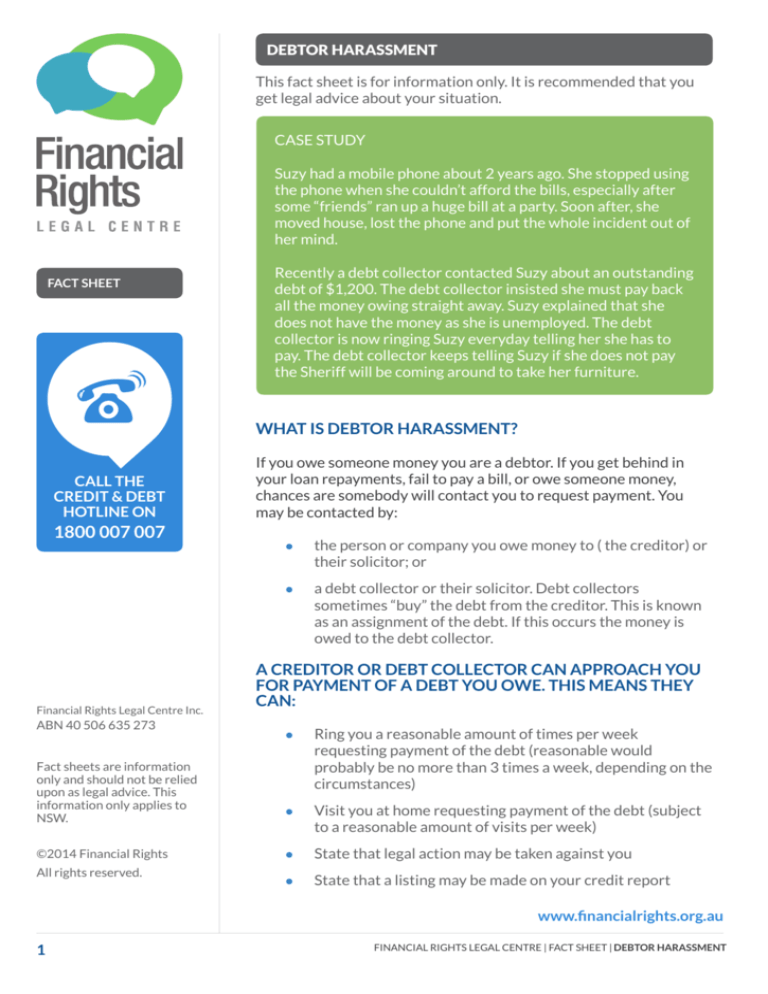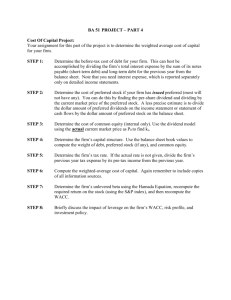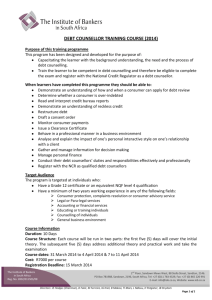
DEBTOR HARASSMENT
This fact sheet is for information only. It is recommended that you
get legal advice about your situation.
CASE STUDY
Suzy had a mobile phone about 2 years ago. She stopped using
the phone when she couldn’t afford the bills, especially after
some “friends” ran up a huge bill at a party. Soon after, she
moved house, lost the phone and put the whole incident out of
her mind.
FACT SHEET
Recently a debt collector contacted Suzy about an outstanding
debt of $1,200. The debt collector insisted she must pay back
all the money owing straight away. Suzy explained that she
does not have the money as she is unemployed. The debt
collector is now ringing Suzy everyday telling her she has to
pay. The debt collector keeps telling Suzy if she does not pay
the Sheriff will be coming around to take her furniture.
WHAT IS DEBTOR HARASSMENT?
CALL THE
CREDIT & DEBT
HOTLINE ON
1800 007 007
Financial Rights Legal Centre Inc.
ABN 40 506 635 273
If you owe someone money you are a debtor. If you get behind in
your loan repayments, fail to pay a bill, or owe someone money,
chances are somebody will contact you to request payment. You
may be contacted by:
●●
the person or company you owe money to ( the creditor) or
their solicitor; or
●●
a debt collector or their solicitor. Debt collectors
sometimes “buy” the debt from the creditor. This is known
as an assignment of the debt. If this occurs the money is
owed to the debt collector.
A CREDITOR OR DEBT COLLECTOR CAN APPROACH YOU
FOR PAYMENT OF A DEBT YOU OWE. THIS MEANS THEY
CAN:
●●
Fact sheets are information
only and should not be relied
upon as legal advice. This
information only applies to
NSW.
Ring you a reasonable amount of times per week
requesting payment of the debt (reasonable would
probably be no more than 3 times a week, depending on the
circumstances)
●●
Visit you at home requesting payment of the debt (subject
to a reasonable amount of visits per week)
©2014 Financial Rights
●●
State that legal action may be taken against you
All rights reserved.
●●
State that a listing may be made on your credit report
www.financialrights.org.au
1
FINANCIAL RIGHTS LEGAL CENTRE | FACT SHEET | DEBTOR
FINANCIAL
HARDSHIP
HARASSMENT
If you are contacted by a creditor or a debt collector DON’T PANIC! For
some information about your options see Fact Sheet: Dealing with Debt
Collection.
Sometimes creditors/debt collectors go beyond what they are legally
allowed to do in demanding payment for the debt. This is called debtor
harassment.
WHAT A CREDITOR/DEBT COLLECTOR CAN’T DO
If someone says that you owe them money, they cannot:
FACT SHEET
●●
Have you sent to jail and cannot threaten to send you to jail
●●
Threaten you with harm
●●
Threaten to tell your employer, neighbours or family about your
indebtedness
●●
Take and sell (or threaten to take and sell) any of your property
over which they do not have a mortgage or other form of security
unless they have an order from the Court
●●
Threaten to garnishee (take) money from your wages without a
court order
●●
Ring you very frequently (say four times per week or more
without good reason) or ring you at unreasonable times such as
very early in the morning (before 7am) and/or very late at night
(after 8pm)
●●
Visit or ring you at your place of work if you have asked them
not to and you have provided an alternate contact address and
phone number
●●
Visit or ring you at work so that third parties become aware of
the debt collection
●●
Send you letters that look like court documents (but are not
court documents)
●●
Use abusive or threatening language.
THINGS YOU SHOULD DO IF SOMEONE IS TRYING TO COLLECT
A DEBT FROM YOU
●●
Keep written records and copies of documents.
●●
Every time a debt collector contacts you write down the time,
date, what was said and the name of the person you talked to.
●●
Get advice or assistance. You should contact either a financial
counsellor or a community legal centre to see if they can assist
you. A financial counsellor may be able to assist you to work out
ways to repay the debt. A legal centre may be able to assist you
with writing to the creditor or making a complaint to a consumer
protection agency or the police. (See Getting Help )
www.financialrights.org.au
2
FINANCIAL RIGHTS LEGAL CENTRE | FACT SHEET | DEBTOR
FINANCIAL
HARDSHIP
HARASSMENT
●●
Write to the debt collector. You should write to the debt
collector and ask them to stop harassing you. See Sample Letter
– Debtor Harassment. Keep a dated copy of your letter and any
reply.
●●
Lodge a dispute in an external dispute resolution scheme (if
available)
●●
Make a complaint to a consumer protection agency
WHAT YOU CAN DO IF YOU ARE BEING HARASSED OVER A
DEBT?
FACT SHEET
Please note that if you have been harassed this does not mean that you
do not have to pay the money you owe. If you dispute the debt, get legal
advice – see Fact Sheet: Getting Help.
1. LODGING A DISPUTE IN AN EXTERNAL DISPUTE
RESOLUTION SCHEME (EDR)
If the debt collector is in EDR, you can lodge a dispute about the debtor
harassment. The debt collector is likely to be in an EDR if the debt was
originally a loan, for example, a credit card debt, a phone debt or a utilities
debt.
There are two EDR’s to check for loans:
FOS Financial Ombudsman Service
www.fos.org.au; Phone : 1300 780 808
COSL Credit Ombudsman Service
www.cosl.com.au; Phone: 1800 138 422
If the debt was originally a telecommunications or energy and water
debt, you need to lodge in the relevant EDR against the original company
where you obtained the service.
TIO
Telecommunications Industry Ombudsman
www.tio.com.au; Ph: 1800 062 058
EWON Energy & Water Ombudsman NSW
www.ewon.com.au; Ph: 1800 246 545
If the debt collector is a member of an EDR, you can lodge in EDR to
request compensation for any debtor harassment you have suffered.
www.financialrights.org.au
3
FINANCIAL RIGHTS LEGAL CENTRE | FACT SHEET | DEBTOR
FINANCIAL
HARDSHIP
HARASSMENT
2. CONSUMER PROTECTION AGENCIES
It is worth considering making a complaint to the relevant consumer
protection agency if you have been the victim of debtor harassment. The
consumer protection agency may not be able to assist you personally
but it will provide information about any debt collector misconduct. If
there are a number of complaints about a particular debt collector the
consumer protection agency may investigate.
The relevant consumer protection agencies are:
ASIC Australian Securities and Investments Commission
ASIC has national responsibility for debtor harassment relating
to credit (credit being loans of all types to consumers). If you
are being harassed about repayment of a loan, you should make
a complaint to ASIC.
FACT SHEET
ACCC Australian Competition and Consumer Commission
If the debt in question was not a loan (for example, an unpaid
phone bill) you can make a complaint to the ACCC.
NSW POLICE
If you have been physically assaulted or verbally abused or harassed or
intimidated by a person seeking to recover a debt you should report the
incident to the police. The police may charge the person or assist you to
take out an apprehended violence order (AVO) against the person.
In NSW most debt collection companies are licensed commercial agents.
Some forms of harassment and other criminal offences may be relevant
to revoking or refusing to renew a debt collector’s license.
The police are notified when an application is made to the Local Court for
a license. The Police can object to the granting of the licence. An objection
can be on the basis that a person is:
●●
not of good fame or character; or
●●
is not a fit and proper person to hold a licence; or
●●
has been disqualified under the Commercial Agents and Private
Inquiry Agents Act from holding a licence; or
●●
has been convicted of an offence punishable by indictment.
If an objection is made, then the licence application is listed for hearing at
court.
NEED SOME MORE HELP?
See Fact Sheet: Getting Help for a list of additional resources.
Last Updated: February 2014
4
www.financialrights.org.au
FINANCIAL RIGHTS LEGAL CENTRE | FACT SHEET | DEBTOR
FINANCIAL
HARDSHIP
HARASSMENT








